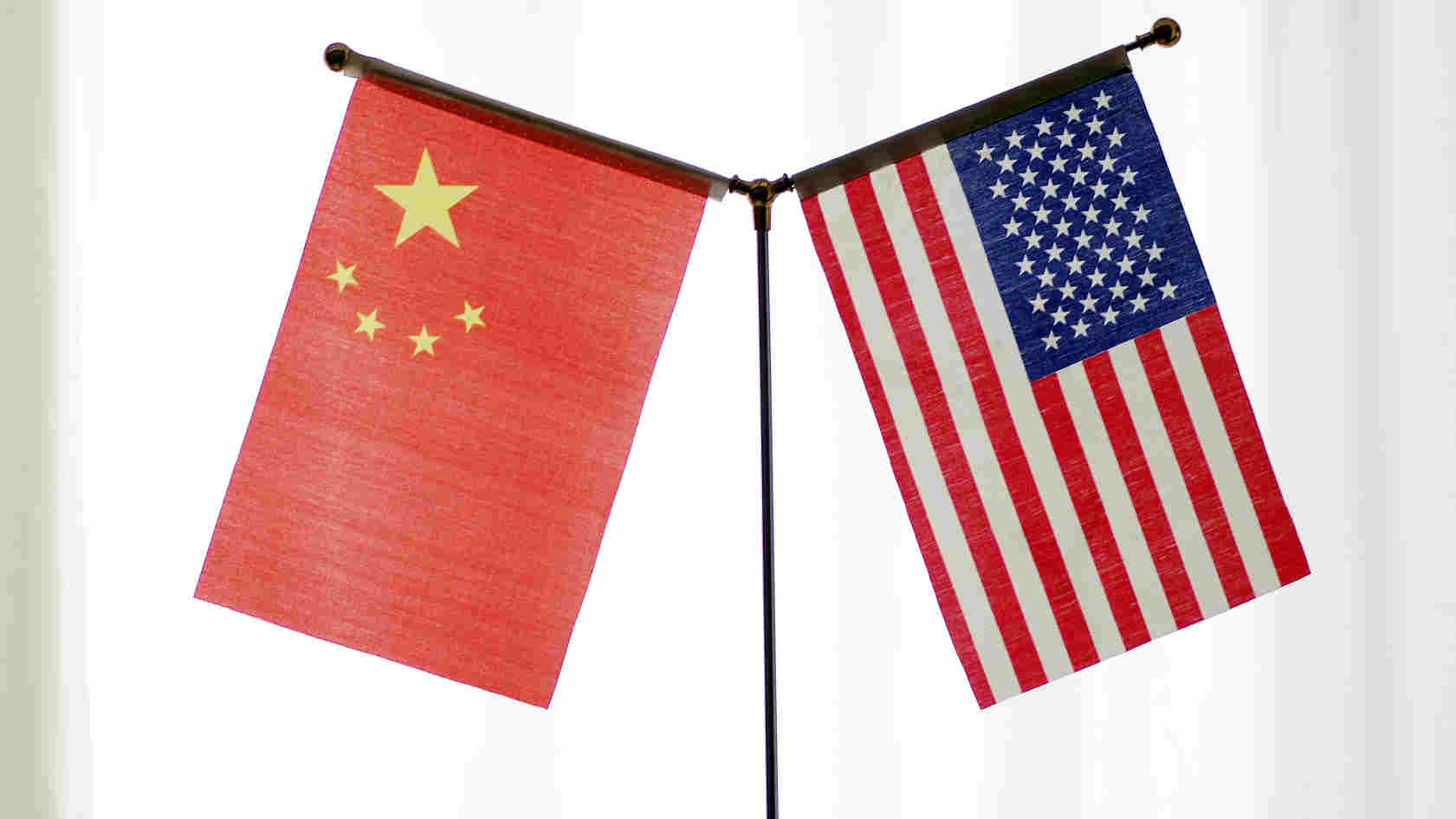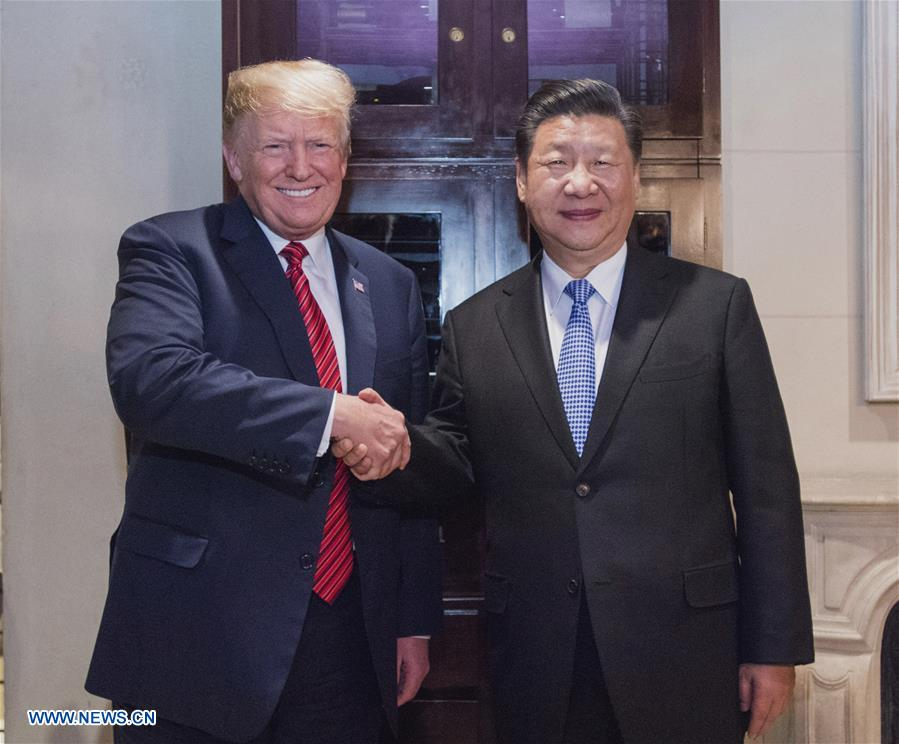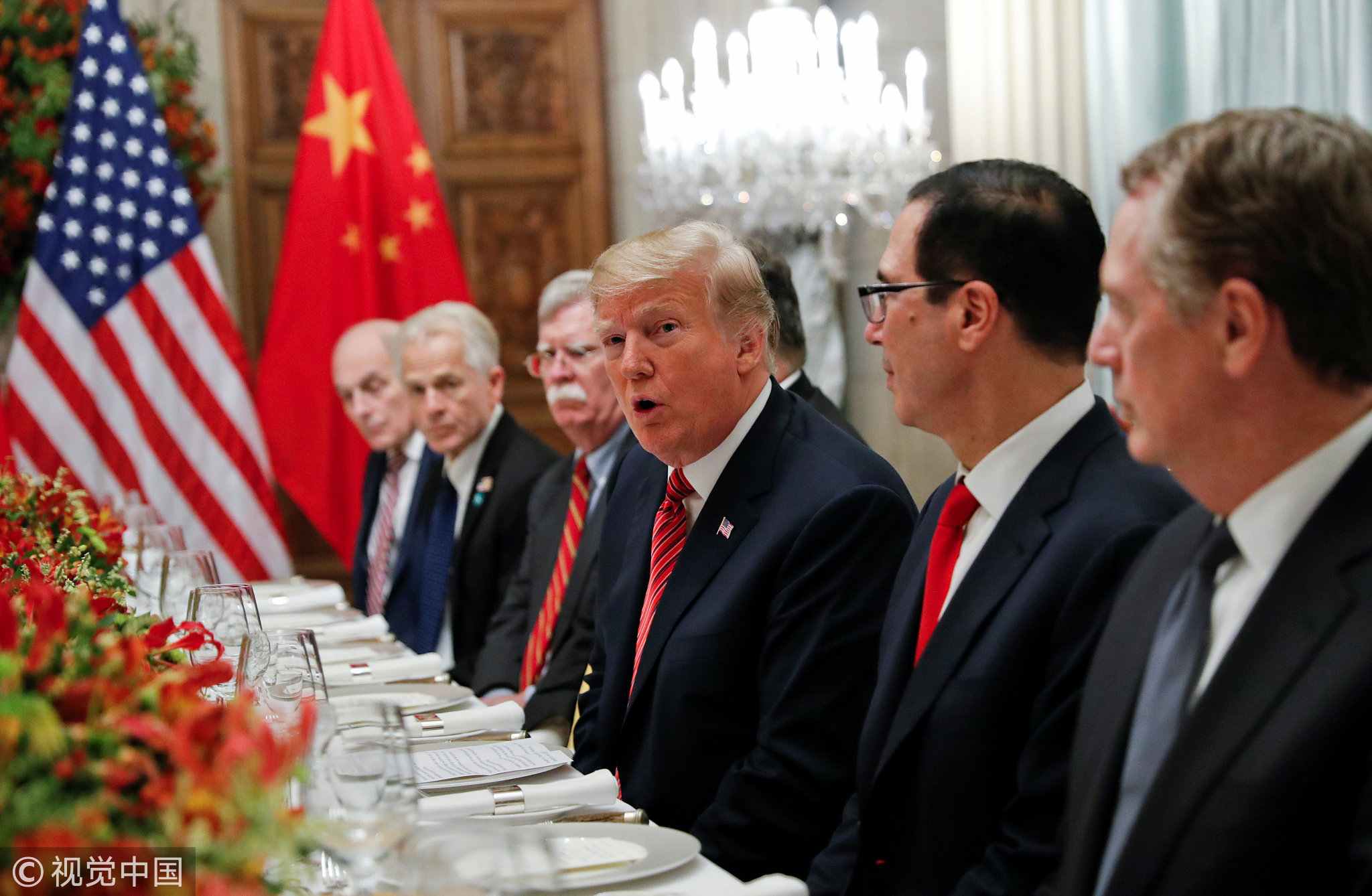
Opinions
23:01, 02-Dec-2018
Opinion: Xi-Trump G20 meeting sends three clear signals
Updated
22:09, 05-Dec-2018
CGTN

Editor's note: The article is translated from an article originally published in the Wechat official account of Bullpiano.
On December 1, in the Argentine capital of Buenos Aires, the heads of state of China and the United States held a historic dinner meeting.
According to Wang Yi, Chinese State Councilor and Foreign Minister, the meeting was friendly and frank and lasted for two and a half hours, far exceeding the scheduled time. The two sides reached a consensus not to levy any more tariffs on each other. The White House press spokesperson later commented that it was a "very successful meeting."
Meanwhile, in accordance with the statement issued by the U.S, the main achievements of this meeting are:

Chinese President Xi Jinping (R) meets with his U.S. counterpart Donald Trump in Buenos Aires, Argentina, December 1, 2018. /Xinhua Photo
Chinese President Xi Jinping (R) meets with his U.S. counterpart Donald Trump in Buenos Aires, Argentina, December 1, 2018. /Xinhua Photo
1. The China-U.S. trade friction will not escalate anymore, and neither side will impose new tariffs;
2. The tariffs imposed by the U.S. on the 200 billion U.S. dollars of Chinese goods will remain at 10 percent after January 1, 2019, rather than the 25 percent announced previously;
3. The two sides will step up consultations. Once an agreement is reached, all tariffs imposed this year may be canceled. Undoubtedly, this is a very positive and significant progress, although there are still possibilities of new twists and turns.
The China-U.S. trade war has thus entered a new phase, sending at least three clear signals.
Signal No.1: The determination and stance of China to defend its core interests are consistent and immovable. From spring to winter, this unprecedented trade fist-fight has been going on for over half a year.
In this conflict that deserves to be written into history, a prominent highlight is that China's determination and stance of defending its core interests are firm. Whoever violates China's bottom line will be fought back forcefully.
Trump thought that as long as he played his card of 50 billion dollars extra tariffs, China would succumb. But every time the U.S. imposed higher tariffs, it was met with a counter-attack. The bilateral agreement reached earlier was rendered toothless.

U.S. President Donald Trump (third from right) attends a working dinner with Chinese President Xi Jinping (unpictured) after the G20 summit in Buenos Aires, Argentina, December 1, 2018. /VCG Photo
U.S. President Donald Trump (third from right) attends a working dinner with Chinese President Xi Jinping (unpictured) after the G20 summit in Buenos Aires, Argentina, December 1, 2018. /VCG Photo
In the White Paper on “The Facts and China's Position on China-U.S. Trade Friction” published on September 24, it's clearly stated that China is firmly committed to safeguarding its national dignity and core interests. China does not want a trade war, but it is not afraid of one and will fight one if necessary.
In a word: China is open to talks but will put on a fight if necessary.
Of course, China is very aware that there is no winner in a trade war, and there is a price to pay if forced into one, but it's worth a fight because it is for the long-term national interests and for maintaining global free trade. In fact, the escalating trade war has cast a heavy shadow over the U.S. economy and its stock market. Despite putting on a tough look, the U.S. actually faces huge pressure and hopes to reach an agreement as soon as possible.
Signal No.2: Head-of-state diplomacy has played a tremendous role in China-U.S. relations.
At some key moments in history, key people always play a decisive role in determining the course of history.
Since March 22 when the U.S. started the trade friction against China, the top leaders of China and the United States had two conversations over the phone and a formal meeting in Argentina during the G20 summit.

A shop employee sorts products for a shelf of imported foods at a supermarket in downtown Shanghai, April 11, 2018. /VCG Photo
A shop employee sorts products for a shelf of imported foods at a supermarket in downtown Shanghai, April 11, 2018. /VCG Photo
Every conversation took place at a key juncture to prevent China-U.S. economic and trade negotiations from spiraling out of control and show a new direction for both sides to break the impasse.
The top leaders have taken efforts to determine the principles and directions. It's down to the negotiating teams to hold specific consultations. China's firm defense of its core interests is beyond doubt, but it has been flexible on specific measures.
Signal No.3: China should assume a good mentality in face of the change and stay committed to its own goals.
Since the inception of the trade war, China has not lost its rationality because of the U.S. offensive and bullying, and it has not panicked.
In fact, while the trade war escalates, China has been pushing for greater openness in an orderly manner. China has cut tariffs four times in a year. The First China International Import Expo in Shanghai was attended by thousands of businesses around the world, fully demonstrating China's determination to open up to the world the charm of its market.
In the World Bank's latest Doing Business Report, China's ranking has risen by 32 places from the previous year, which is quite impressive.
As the world's second largest economy, China has a huge market, a complete industrial supply chain, enabling infrastructures and business environment that no country can afford to lose. This gives the country great confidence in dealing with the trade war.
It must be noted that people shouldn't be overenthusiastic or complacent about this positive development. People wouldn't forget that China and the United States reached an agreement earlier this year, only to be torn up by the U.S. side unilaterally, leading to the escalation of the trade war. Therefore, the tricky tango between the two sides will continue.
History shows that if two nations embark on confrontation, whether it is cold war, hot war or trade war, there will be no winner. As long as countries treat each other as equals, deepen mutual understanding and make necessary compromises, there will be no problem that cannot be resolved through consultation.
(If you want to contribute and have specific expertise, please contact us at opinions@cgtn.com.)

SITEMAP
Copyright © 2018 CGTN. Beijing ICP prepared NO.16065310-3
Copyright © 2018 CGTN. Beijing ICP prepared NO.16065310-3